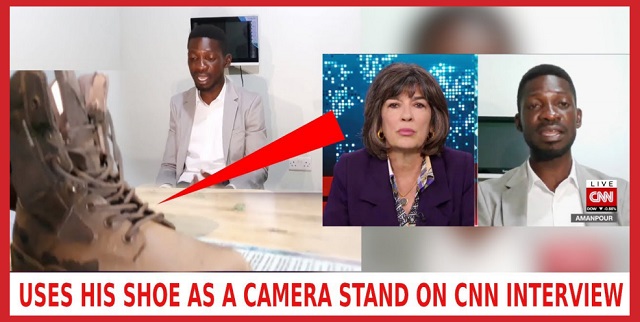
AMANPOUR: Bobi, let me ask you this, because I just wonder whether you think the January election is going to be free and fair. And, if not, what do you think the recourse is? We have seen what happened in Belarus a few months ago. We saw the international community, the E.U. make some noises, but not a massive amount has happened there. We have got a new president and a new administration coming into the United States. They say they’re going to put human rights back certainly somewhere centrally in their foreign policy. What do you think the U.S. — what are you calling on the United States to do? Because let’s not forget, the president is a very close ally, has even visited the White House.
WINE: First of all, I know that already the election is not free and fair. We are only going into this election as a protest vote, because we know that the people of Uganda, even amid this intimidation, even amid this harassment, they will come out and massively vote. And, yes, I am sure they’re going to vote out President Museveni, because 35 years is just enough. My only plea to the United States and the entire development community, the entire international community, all the development partners, we have always been calling upon them to put the observation of human rights and the human as a precondition for cooperation here in Uganda. We know that the United States, it has very strong partnership in Uganda. We receive over $100 million a year to work with security. But again, this is the same money that is being used to murder people, to oppress Ugandans and to abuse human rights. Just less than — just over two weeks ago, more than 100 Ugandans were shot and killed for showing support for me, for coming out to protest. And yet, because it’s within the law to protest this fully. We do not have any guns. We do not have any stones but we are being attacked brutally by the police and the military that are (inaudible). People are being slaughtered every day by a president that takes pride in murdering people. Just the other week President Museveni came out and confirmed that he indeed had ordered for the mass murder of the people of Uganda. So, we call upon the United States to put the rule of law and observation of human rights as a pre-condition to cooperation and also call to order President Museveni who seems not to listen to any other voice apart from the international community and precisely the United States of America.
AMANPOUR: Just — I’m just going to put their position before I head to another question. The government says that you were arrested and you’ve been, you know — well, I mean, I can say harassed, they’d say stopped because you were “breaking COVID rules by campaigning.” But I want to ask you this. You call yourself or you are known as the Ghetto President. What is it that young Ugandans, the majority of the country, as we said, 80 percent of the country is under 35 years old, what are they yearning for there, beyond the obvious freedom? What do they want for their — for Uganda?
WINE: Young Ugandans are yearning of freedom of speech, for freedom of expression. They are yearning for the basic human rights. They are yearning for right to live. Young Ugandans are yearning for the opportunity to determine their destiny. It has been 35 years of stagnation. Young Ugandans feel like they are fast forward brains stuck in a third world country. I mean, they believe that they don’t live in a third world country. We only have third world leaders. We — young Ugandans are yearning for democracy, they are yearning for their voice to be heard. They want to speak and be heard. They want the right to determine their destiny. That is what young Ugandans are calling for. They want to live their whole potential. They feel like they are not living their lives. They feel like they are being owned. They feel like they are being enslaved in the 21st century in their own land. They want democracy in the real sense of the world.
AMANPOUR: It is, of course, extraordinary, that 35 years ago, Museveni took part in the rebellion that brought down the dictator, Idi Amin, and here we are 35 years later. Let me just ask you very quickly and finally, are you afraid for talking to us, for making this international interview now?
WINE: Well, yes, and no. First of all, I am afraid because the majority of people that I’ve spoken out in Uganda have ended up dead or ended up in exile or in prison. So, I expect the worst anytime. But again, I’m not feeling afraid because I know that the international media has — is one of the factors that have kept me alive. I know no matter how ferocious the dictator, President Museveni, is, he is afraid of the international community. He knows how all the dictators have ended up in the past. He has been close friends with Mugabe, he has been close friends with Omar al-Bashir, he has been close friends with Muammar al-Gaddafi. And he knows how all dictators have ended and what —
AMANPOUR: OK.
WINE: — that what is happening in Uganda is actually being projected on the world screen. So, it is —
AMANPOUR: All right.
WINE: — scary to talk to you, but, again, it is safe to talk to you at the same time.
AMANPOUR: Well, you’re being very brave, Bobi Wine, and we hope to invite the president on to put some of these issues to him. Thank you very much for joining us.
****
 The Independent Uganda: You get the Truth we Pay the Price
The Independent Uganda: You get the Truth we Pay the Price





